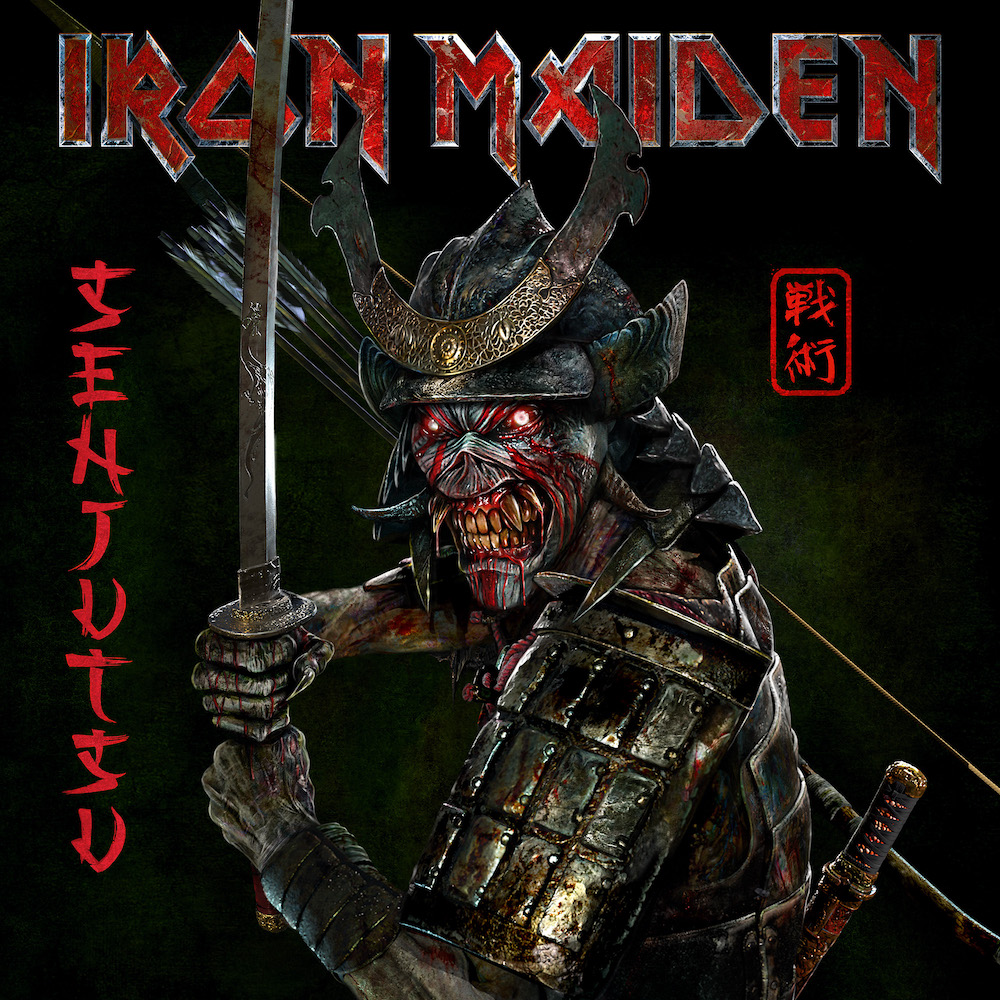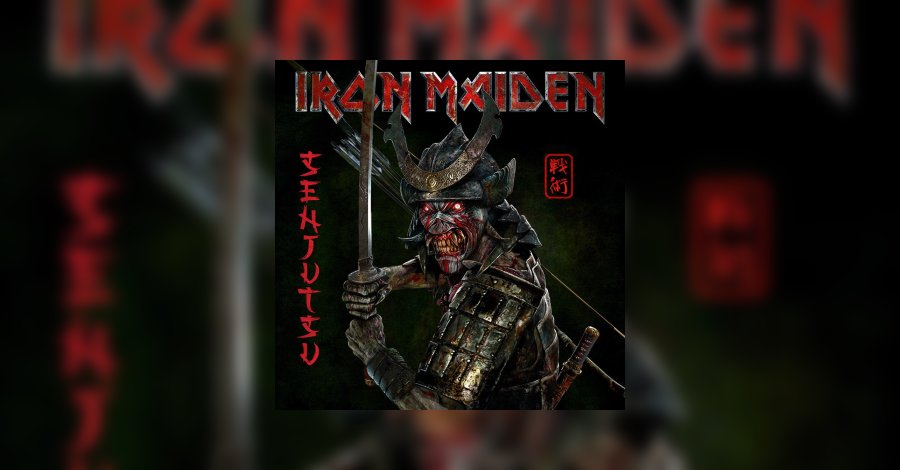IRON MAIDEN kehren mit einem mächtigen Album zurück auf das Parkett und beschwören die Geister aus den mittleren Jahren der Band.

www.metal.de
special thanx to google translate
One thing is clear: the rhythm in which IRON MAIDEN recently released albums cannot be compared with the boisterous early years. Especially since demand determines the market and there is one thing Maiden fans are certain: happy and patient. Again, it can't be too difficult, because almost every newcomer will soon be released a live album of the accompanying tour. So there is enough content between the plates. And now - in the midst of a worldwide pandemic - the veterans, the founders of a sub-genre, those who seduced virginal and innocent youngsters into heavy metal a million times over, are releasing the long-awaited “Senjutsu” in the twinkling of an eye. seventeenth studio plant. That alone is reason enoughto properly dissect the record and take a close look at the songs in this review one by one.
IRON MAIDEN make it Asian
After the very progressive paths that had been followed on “
The Final Frontier ”, “
The Book Of Souls ” was a current reincarnation of the Egyptian saga “
Powerslave ” in a Latin American guise greeted a grimly grinning Eddie in the form of a samurai, which means that one has dealt with a certain ethnic group again. The title track cannot be associated with Asian sounds and melody patterns when you listen to it for the first time, and it drags itself unexpectedly heavy through its eight-minute game length. In the last part, the outer corners of the listener's mouth involuntarily bend upwards, because at least the main riff changes into a kind of power
slave-Testimonial, while a dark solo and even darker keyboards come over the flanks.
If you don't keep up with the times, you have to keep up with the times
Reminiscences are also awakened with the following “stratego”. “Fates Warning” from the unloved “
No Prayer For The Dying”Celebrates a small, very strong revival in the pre-chorus, while the track grooves its way into the delightful mid-tempo in the dance muscle. But especially the instrumental middle section again has the oriental touch of IRON-MAIDEN dynamics, which should not be missing for friends of the 1980s era. At the latest with the already well-known “The Writing On The Wall” the Brits prove that they are quite capable of freeing their music from - in a positive sense - clichés and delivering a pounding country beat intro. If a lap steel or resonator guitar sounds in an open mood, it could also be a modern heavy southern rock number. With the broad chorus, Bruce Dickinson throws the hook off and pulls the listener back into safe Maiden waters.Even the melody part could move to tears live when thousands upon thousands of people join in fervently. Unfortunately, the position is a little too short to be permanent.
Well-known trademarks and a few surprises
Also the classic ballad-like, homely tearful scrap in the form of “Lost In A Lost World” is not missing, whereby the cheesy prelude ends after a good two minutes and the song happily slips into the purposeful format of the classic Maiden neckbreaker. The guitars sound incredibly hard and rough, the voice is partially broadened with a panorama, which is perhaps applied too thickly. Bruce Dickinson still sounds like a twenty year old and has an almost intimidating presence. And then they finally come: the twin guitars, which duel harmoniously in an admittedly quite predictable, but also well-established melody. Nevertheless, better tracks from the band's epic forge (“Fear Of The Dark”, “Alexander The Great”) are known in this context. “Days Of Future Past” is a songwhich one on "
Somewhere In Time ”would certainly not have come as a surprise and offers a really great chorus. Old-school maiden heads will certainly be bothered by the not exactly modestly used keyboards, because they have an even higher status than their time on “
Seventh Son Of A Seventh Son ”.
“Senjutsu” is one of the darkest IRON MAIDEN albums
Also with “Time Machine”, IRON MAIDEN refreshed the output again with an a-typical start. Keyboards and wistful guitars form a symbiosis with the Nicko McBrain machine and Dickinson's harmonies. Towards the second third, the song takes a rhythmically unpredictable turn that is only known in this form from this band. The solo parts take place in three parts, which of course fits the line-up. Purists like to nag Janick Gers and his contribution. The man has been using the six pages for around thirty years for IRON MAIDEN and it is precisely at such moments as here that all individual trademarks are played out wonderfully. The respective rhythm work makes “Time Machine” perhaps the highlight of the entire record.“Darkest Hour” is then as threatening as “Wasting Love”, one of the best “
Fear Of The Dark ”songs through the speakers.
A retrospective of the band's early and middle creative period
The last half an hour on “Senjutsu” is made up of the last three songs, each of which exceeds the ten-minute mark. The intro to “Death Of The Celts” belongs to band boss Steve Harris alone, although the plucked bass sounds a little more brilliant than usual. At the same time, the arrangement is initially only supplemented by keyboards and vocals. The guitars that start later seem to be heavily armed again, they sound unusually present and hard compared to the otherwise always present bass. At the same time one fables about the scope of this composition in memory of “The Clansman”, which also pays tribute to the Blaze Bayley phase.
If the following “The Parchment” were to be called “Powerslave II”, it would probably not surprise anyone. Not because the song can be compared in any way with the original. The oriental melodies involuntarily leave the listener lying under an imaginary canopy in the desert sand, while here and there a few falling stars pass by. Only the continuously sounding keyboard is a bit annoying.
“Senjutsu” comes to a close with the very worn “Hell On Earth”, which is in no way inferior to the two aforementioned tracks in terms of dynamics and epic. The warm-up phase, which lasts more than two minutes, is a pain in the ass because again flat keyboard sounds hit a caustic frequency on this route. A little patience is worth it, however, because the actual song begins in the beloved canter rhythm and conjures up the old ghosts from the IRON MAIDEN hit smithy. Little by little, however, an arrangement builds up that again may seem atypical for the British, even if all trademarks are secretly added up. In any case, “Hell On Earth” is a wonderful loud-quiet number, but it doesn't necessarily have to be at the end of this opulent release.
IRON MAIDEN are back powerfully
On “Senjutsu” friends of every band era will find at least one song for the IRON-MAIDEN-Mix-Tape. But especially the three albums before the change of singer, the band seems to have taken another close look before the recordings. The production and the sound are contemporary, even if you can feel the Maiden-typical, very organically coordinated team playing at all times. With an ambitious playing time of over eighty minutes, the album has of course its lengths, even if, from an objective point of view, there is no pen on it. After two or three runs you have already forgotten the best melodies for exuberant singing along, which obliges the listener to deal thoroughly with “Senjutsu”.
The permanent and one-dimensional keyboards are a real weak point. It may be due to the choice of sound and maybe also to the selected notes in the higher frequency range. But in the end these very naively used keys just don't do justice to the powerful songs and this band.




hardforce.com


